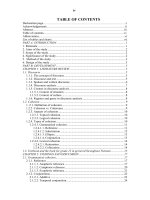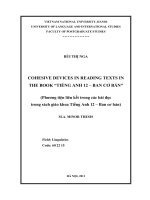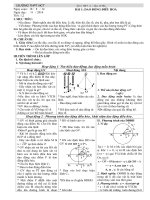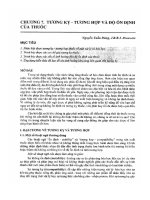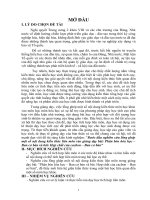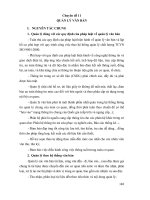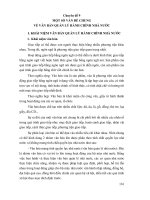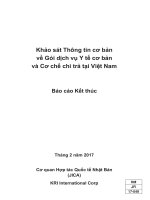- Trang chủ >>
- Y - Dược >>
- Sản phụ khoa
Các thì cơ bản
Bạn đang xem bản rút gọn của tài liệu. Xem và tải ngay bản đầy đủ của tài liệu tại đây (144.24 KB, 41 trang )
Phần I: Các thì - Tenses
1. Hiện tại đơn (Simple present)
• Sử dụng: Hành động, trạng thái hiện xảy ra, sự thật hiển nhiên, một
tập quán, đặc tính, việc tương lai đã lên lịch
A: He speaks.
N: He does not speak.
Q: Does he speak?
• Những từ nhận biết: always, usually, often, frequently, sometimes,
seldom, rarely, every (…), once a week
• Xem xét chủ từ số nhiều hay số ít mà thêm “S/ES” hay giữ nguyên
động từ
• Động từ tận cùng: SS, SH, TCH, X, O, Z thì ta thêm ES nếu chủ từ
là ngơi thứ 3 số ít
• Động từ tận cùng là một phụ âm + Y đổi thành IES
(xem them tai lieu bo sung)
2. Present Progressive: Hiện tại tiếp diễn
Sử dụng: Hành động diễn ra khi nói, Hành động xảy ra ở một thời gian
giới hạn, Hành động được lên kế hoạch thực hiện trong tương lai
A: He is speaking at the moment.
N: He is not speaking at the moment.
Q: Is he speaking at the moment?
Những từ nhận biết: at the moment, just, just now, Listen!, Look!, now,
right now
3. Simple Past : Thì quá khứ đơn
Sử dụng: Hành động, trạng thái đã xảy ra và xong hẳn trong quá
khứ; một tập quán, khả năng trong quá khứ, kinh nghiệm trong quá
khứ (regular and irregular verbs)
A: He spoke.
N: He did not speak.
Q: Did he speak?
• He wandered lonely in town last night
• He didn’t wander lonely in town last night
• Did he wander lonely in town last night?
• Những từ nhận biết: yesterday, ago, in 1990, the other day, last
Friday, when I was a child…
4. Past Progressive : Thì quá khứ tiếp diễn
Sử dụng: diễn tả một hành động thực hiện dở dang trong quá khứ tại một
thời điểm đề cập đến; một hành động đang diễn ra thi có hành động khác
xảy đến
A: He was speaking.
N: He was not speaking.
Q: Was he speaking?
• This time last year I was living in Brazil
• Yesterday, while we were having dinner, Tom phoned me
• Yesterday, Tom phoned me while were having dinner
• Yesterday, we were having dinner when Tom phoned me
• Những từ nhận biết: at + thời gian (yesterday, last night)…when,
while, as long as
5. Present Perfect Simple :Thì hiện tại hồn thành
Sử dụng: một hành động vừa mới hoàn thành, một kết quả của hành động
trong quá khứ mà đến thời điểm hiện tại vẫn còn, một kinh nghiệm đến
hiện tại mới ngưng, một việc đến hiện tại vẫn còn tiếp tục
• A: He has spoken for one hour.
N: He has not spoken for one hour.
Q: Has he spoken for one hour?
• Những từ nhận biết: just, recently, already, not… yet, never, ever,
since (điểm thời gian), for (khoảng thời gian) , before, lately,so far,
till now, up to now
6. Present Perfect Progressive: Thì hiện tại hồn thành tiếp diễn
Sử dụng: Nhấn mạnh hoảng thời gian sự việc đang tồn tại (không phải kết
quả), hành động gần đây đã hoàn hành nhưng vẫn cịn tiếp tục, hành động
hồn thành nhưng có ảnh hưởng đến hiện tại
• A: He has been speaking.
N: He has not been speaking.
Q: Has he been speaking?
• Những từ nhận biết: all day, for 4 years, since 1993, how long?, the
whole week
7. Past Perfect Simple : Quá khứ hoàn thành
Sử dụng: diễn tả một hành động xảy ra trước một hành động khác trong
quá khứ, thường đi cặp với quá khứ đơn
A: He had spoken.
N: He had not spoken.
Q: Had he spoken?
• After + QKHT, QKĐ or QKĐ + after QKHT
• Before+QKĐ, QKHT or QKHT before QKĐ
• Những từ nhận biết: already, just, never, not yet, once, until that
day
8. Past Perfect Progressive: Quá khứ hoàn thành tiếp diễn
Sử dụng: Hành động xảy ra trước một thời điểm nhất định nào đó trong
q khứ, Đơi khi dùng chung vớ thì q khứ hồn thành, nhấn mạnh
khoảng thời gian hoặc q trình thực hiện hành động
• A: He had been speaking.
N: He had not been speaking.
Q: Had he been speaking?
9. Future Simple : Thì tương lai đơn
Sử dụng: Hành động xảy ra trong tương lại mà không bị ảnh hưởng,
quyết định ngay trong lúc nói, giả định tương lai
A: He will speak.
N: He will not speak.
Q: Will he speak?
Những từ nhận biết: in a year, next …, tomorrow
10. Near future: Tương lai gần
b: Quyết định được thực hiện cho tương lai, kết luận về tương lai
A: He is going to speak.
N: He is not going to speak.
Q: Is he going to speak?
Những từ nhận biết: in one year, next week, tomorrow
11. Future Progressive: Tương lai tiếp diễn
Sử dụng:Hành động sắp xảy ra ở một thời đểm trong tương lai, hành
động chắc chắn xảy ra trong tương lai gần
A: He will be speaking.
N: He will not be speaking.
Q: Will he be speaking?
Những từ nhận biết: in one year, next week, tomorrow
12. Future perfect: Tương lai hoàn thành
Sử dụng:Hành động sẽ hoàn thành ở một thời điểm nhất định trong tương
lai
A: He will have spoken.
N: He will not have spoken.
Q: Will he have spoken
Những từ nhận biết: by Monday, in a week
Bài tập
• She doesn’t work, she (swim) now
• She (see) him at the supermarket yesterday
• We (eat) dinner before we came here
• She (play) the piano when our guests (arrive) last night
• This message (just, arrive)
• While we (plant) trees, the principal (come) and (talk) to us
• Buses (pass) my house everyday
• We (live) here since 1990
• They (ride) home from school now
• She (fly) to New York tomorrow
• I (go) to Dalat last week and I (stay) there for five days
• The boys (play) football in the field when I arrived
Phần II: Pasive voice (Thể thụ động)
• Active:
S + V + O+ M
• Passive:
S+ Be+V3/ed + M+ by O
Ex: Khoa bought this book in Can Tho
This book was bought in Can Tho by Khoa
• Simple Present
• am, is, are + V3,ed + … + By O
• Ex: My daughter cleans the floor
• -------------------------------------------------• Simple past
• Was, were + V3,ed+….+ by O
• Ex: Nam wrote this letter
• --------------------------------------------------• Simple Future
• Will, shall + Be + V3,ed+…+by O
• Ex: She will teach our class
• --------------------------------------------------• Present continuous
• am, is, are + being + V3, ed+…+ by O
• Ex: Mary is cooking dinner
• --------------------------------------------------• Past Continuous:
• was + being +V3, ed+…+ by O
•
I was studying English at 2.00 yesterday
• --------------------------------------------------• Future Continuous:
• Will, Shall+be + being+ V3, ed+……+ by O
• Mary will be cleaning the door
• --------------------------------------------------• Present Perfect:
• Has, have + been + V3, ed
• The boy has found the key
• --------------------------------------------------• Past Perfect:
• had + been + V3, ed
• Mary had made this cake
• -------------------------------------------------• Future Perfect:
• shall
•
+ have + been + V3, ed + ….+ by O
He will have sold this car
• --------------------------------------------------• NEGATIVE:
•
Saints didn’t build that temple
• --------------------------------------------------• No one looks after the children
• ------------------------------------------------• YES_NO QUESTION:
• Ex: Did your mother make this cake?
• ---------------------------------------------------------• WH_QUESTION:
• Ex: Who wrote this book ?
• --------------------------------------------------• VERB OF 2 OBJECTS: (Động từ có 2 túc từ)
• Indirect Oject-I.O (Túc từ gián tiếp)
• Direct
Object
(Túc
Ex 1:John gives me a book
từ
trực
tiếp)
• --------------------------------------------------•
John gives a book to me.
• --------------------------------------------------• Ex 2:I bought my sister some pens
• --------------------------------------------------•
I bought some pens for my sister.
• --------------------------------------------------• TO: give, send, show (chỉ, đưa cho), lend, promise, hand, pay, read,
wish, offer, read, tell, throw
• FOR: get (mua), order (đặt mua), spare (dành cho), bring, make,
leave (bỏ lại), save (để dành), sell, buy
• DEFECTIVE VERBS (Động từ khiếm khuyết ở câu Passive)
• S + Def.V + Be +P.P
• May,
might,
ought
Ex: He can speak English.
to.
Can,
• ---------------------------------------------------
could,
must
•
NẾU TRONG CÂU ACTIVE CÓ VERBS OF PERCEPTION
(động từ tri giác): SEE, WATCH, HEAR, MAKE…
• Thì động từ theo sau khơng TO chuyển thành động từ có TO ở câu
passive
• Ex: He makes me do it
• --------------------------------------------------• Nếu S trong câu ACTIVE là I, HE, SHE, IT, WE, YOU, THEY,
SOMEONE, PEOPLE…
• Any
• Some
one
• body
• No
thing
• Every
• Khi chuyển sang PASSIVE có thể bỏ BY ME, BY HER, BY US,
BY YOU, BY THEM, BY HIM, BY SOMEONE…
• Ex: People speak English all over the world
• --------------------------------------------------• Ex: Someone stole my purse
• --------------------------------------------------• VERB FOLLOWED BY A PREPOSITION
• Our sister looks after our children.
• Causative form: nhờ bảo, sai khiến
•
Chủ
động :S+ have + O (person) + V (bare Infinitive) +O (thing)
•
Bị
động : S + have +O (thing) + V3
•
• Ex: I have the barber cut my hair
-> I have my hair cut by the barber
• Bị động kép : Động từ chính ở hiện tại
• People + think/say/suppose/believe/consider/report…+that + clause
* It’s+thought/said/supposed/believed/considered/reported…+that+clause
* S + am/is/are+thought/said/supposed/believed/considered/reported…+to
+ V –inf.
• Ex: People say he is a good doctor.
– It’s said that he is a good doctor.
– He is said to be a good doctor.
• S + am/is/are +
thought/said/supposed/believed/considered/reported…+to + have PII
• Ex: People think he stole my motorbike.
– It’s thought that he stole my motorbike .
– He is thought to have stolen my motorbike.
• Dạng đặc biệt (câu 8 p 99, test 4)
• Active: S+ have, has, had, be having+ someone+ V1
• Passive:S+ have, has,had, be having+ something+V3/Ved…
• Ex: I have the barber cut my hair
I have my hair cut
• Câu 5 trang 113 test 5 (p43)
• His parents made him study for his exams
• He was made to study for his exams by his parents
• Câu 9 trang 115 test 6 (wh-question)
• I’ve never heard of it. Where was it made?
• Câu 10 trang 115 test 6 (Mệnh đề danh từ)
• I am not sure where it was made
• Câu 11 trang 115 test 6
• He was sacked after having an argument with his supervisor
(meaning)
• Câu 16 trang 116 test 6
• Children can be instructed in swimming. They can be taught how to
swim
(Động
từ
khiếm
khuyết:
model
verbs
meaning)
• Câu 4 trang 121 test 6
• Dạng đặc biệt
•
They/People + believe/think/say/report + that + S +V + O
• It is believed/thought/said/reported + that + S + V +O
• S + be+ believed/thought/said/reported + to infinitive
• He is believed to be mad
• Câu 5 trang 121 test 6
• We are having our house painted by a local firm
Passive voice exercises
• Pine trees are found in many parts of the world
•
• The fire was put by the firemen very quickly
•
• Comedies are usually preferred to tragedies
•
• No prizes were won by bad students
•
• The meat is eaten by the lions with pleasure
•
• Glasses of wine weren’t drunk out
•
• The book was written carefully
•
• A sound wasn’t heard
• Someone wants the table to be laid by you
•
• His uncle was made a captain of the football team
•
• The rest of us was asked to be there at eight o’clock
•
• We are promised higher wages
•
• By whom was the telephone discovered?
•
• You are simply laughed at for your trouble
•
• All the people are made happy by the King
•
• People found him lying injured on the pavement
•
• Kind friends supplied him plenty of money
•
• The police closely asked them
•
• They took the injured man to the hospital
•
• The earthquake did a lot of damage
•
• The maid washed the floor this morning
•
• His brother gave him a bike for his birthday
•
• They read prayers after the ceremony
• People know that he is a famous scientist
• He is
• His parents have made him work like a horse
• He
• People said that he treated his wife badly
• He
• We had the porter take our luggage into the room
Phần III: PHRASES AND CLAUSES
Cụm từ và mệnh đề
* Phrases and clauses of concession
Mặc dù, bất luận thế nào (đầu câu): Though/Although, Even though, Even
if, Much as (clause of concession)
Ex: Although the team played well, they lost
(Clause of concession)
main clause
Nhưng, tuy nhiên (giữa câu)
• Despite, in spite of, for all, notwithstanding + possessive adjective
+ N/Ving
or +Phrase
Ex: Despite their playing well, they lost
For all his wealth and fame, he’s a very lonely man
• Subject + verb + object, BUT/YET/NEVERTHELESS + main
clauses
Ex: I am very hungry, but I dare to eat much
• V3/Ved/adjective/ Adverb + As/Though +Subject+Verb, main clause
Ex: Old as he is, he still manages to enjoy life
• Whatever=no matter what: bất luận gì đi nữa
• Whoever = no matter who: bất luận ai đi nữa
• Whenever= no matter when: bất luận khi nào
• However = no matter how + adjective: dù thế nào đi nữa
• Try as + Adjective + as I might = No matter how I tried: dù tôi cố
gắng mấy đi nữa
Exercises
• If you like, you can eat everything (whatever)- You can…..
• No matter what you say, I won’t believe you-Whatever you say…
• However much ill children are, they still try to smile-No matter
how…/In spite of
• Although it rains heavily, we go to school-Despite……
• In spite of his trying, he couldn’t pass the exam/Although…/Try
as…
PHRASES AND CLAUSES OF REASON
S + V + O because/Since/As/For + S + V+O
Main clause
Subordinate clause
Ex: Since/As he had not paid his bill, his electricity was cut off
As it’s raining again, we’ll have to stay at home
I am leaving because I’m fed up
I decided to stop and have lunch, for I was feeling hungry
• S + V + O Because of/due to+ V-ing/N phrase
Ex: They stayed at home because of the rain
Why questions and clause of reason
Ex: Why is he going to the post office?
Exercises
Rewrite these sentences using BECAUSE OF
• They didn’t come to your party because they had a meeting
•
• The train couldn’t continue to go because the fog was so thick
•
• We postponed our trip to Dalat because the weather was too bad
• She was absent yesterday because her father was ill
Phần III: PHRASES AND CLAUSE OF PURPOSE
S + V + O + so that/in order that + Clause
Ex: I study hard so that I can pass this exam
She drinks orange juice in order that she isn’t thirsty
S + V + O + to/in order (not) to/so as to + infinitive + O
Ex: The bank receives money to keep it safe
Exercise
• I am buying paint. I want to paint my hall door (to/so that)
•
• He opened the lions cage. He intended to feed the lions (in order
to/in order that)
•
• She has a box. She wants to put her savings in it (so as to/so that)
•
• He rushed into the burning house. He wanted to rescue the child ( in
order to)
CLAUSES OF RESULT
• Too….to
• S+V+Too +Adj + (for me/him/her…) to V1
• Ex: The tea is too hot for me to drink
• Enough to
• S + V +Adj + Enough + (for me…) to V1
• Ex: The man is not strong enough to run far
• So…that
• S + V + So adj/Adv that +Subject+ Can/can’t +V1 + object
• Ex: I am so weak that I can’t lift this metal box
• Such…that
• S+ V + such (a/an) +adjective + N + That + S + can/can’t + V1 +
object
• Ex: That was such an exciting match that it pleased a large number
of fans
Exercise
Using too…to, enough to, so…that, such…that to combine the
following pairs of sentences
• She is very short. She can’t win Miss World’s diademShe is too…
• This car is very expensive. I can’t buy itThis car is too….
This car (cheap)
• That metal box is very heavy. He can’t carry it
That metal box is too…
That metal box is so….
• The ceiling is very high. She can’t touch it
-The ceiling is too…
The ceiling (short)
• This shirt is very old. She shouldn’t wear it
This shirt is too…
It is such
• They are so busy. They can’t help you
• -They are too…
• These are such
• He is too tired. He can’t walk with you
He is too …
He is (strong)
Phần IV: Hình thức động từ
Một số động từ theo sau bởi “To infinitive”
• Attempt: cố gắng (Attempt to)
• Aim: nhắm, hướng vào
• Be: phải
• Demand: yêu cầu
• Fail: thất bại
• Hope: hy vọng
• Plan: lên kế hoạch
• Intend: dự định
• Tend: có khuynh hướng
• Agree: đồng ý
• Appear: xuất hiện
• Beg: van xin
• Declare: tuyên bố
• Forget: quên
• Learn: học
• Prepare: chuẩn bị
• Refuse: từ chối
• Tell: Kể
• Ask: Yêu cầu
• Choose: chọn lựa
• Decline: từ chối
• Determine: quyết định
• Hesitate: do dự, ngập ngừng
• Manage: xoay sở được, giải quyết
• Promise: hứa
• Seem: dường như, có vẻ
• Want: muốn
• Arrange: sắp xếp
• Claim: địi, quả quyết
• Decide: quyết định
• Expect: mong chờ, trơng đợi
• Remind: nhắc nhở
• Offer: Biếu, tặng
• Prove: chứng minh
• Volunteer: xung phong, tình nguyện
• Advise: khun bảo
• Với những động từ chỉ suy nghĩ, hiểu biết là phải dùng ‘to-V’
Exercises
• Our teacher reminded us (to do) the assignment
• I was broke, so my boyfriend offered (to lend) me some money
• I was advised (to rent) a new apartment
• They refuse (to help) me when I asked them
• The flight attendant reminded us (to fasten) the belts.
NHỮNG ĐỘNG TỪ THEO SAU LÀ V-ING
• Admit: thừa nhận, thú nhận
• Advise: khuyên
• Avoid: tránh né
• Anticipate: đốn trước
• Delay: hỗn lại
• Deny: từ chối
• Dislike: khơng thích
• Discuss: thảo luận
• Consider: xem xét
• Enjoy: thích thú
• Escape: tẩu thốt
• Excuse: thứ lỗi
• Finish: hồn thành
• Forgive: tha thứ
• Imagine: tưởng tượng
• Involve: bao hàm
• Keep: giữ
• Mention: đề cập
• Mind: Lưu ý, bận tâm
• Miss: lỡ
• Pardon: tha thứ, tha lỗi
• Permit: cho phép
• Postpone: trì hỗn
• Practice: thực hành
• Propose: đề nghị
• Quit: bỏ, ngừng,nghỉ
• Recollect: nhớ lại
• Risk: liều
• Suggest: đề nghị
• Stop: ngừng
• Try: cố gắng
• Understand: hiểu
• To be used to: đã từng
• Avoid: tránh né
• Deny: từ chối
• Finish: hồn thành
• Keep: giữ
• To be worth: đáng giá
• Detest: ghét
• Dread: kinh sợ
• Forgive: tha thứ
• Love: u
• Postpone: trì hỗn
• Resist: kháng cự, chống lại
• Start: bắt đầu
• To be no good: khơng tốt
• Can’t stand/help: khơng thể dừng
• Consider: xem xét
• Dislike: khơng thích
• Escape: tẩu thốt
• Hate: ghét
• Mean: nghĩa là
• Practice: tập luyện
• Suggest: đề nghị
• To be no use: khơng có tác dụng gì
• Can’t bear: khơng thể chịu đựng
• Delay: trì hỗn
• Like: thích
• Fancy: thích
• Imagine: tưởng tượng
• Permit: cho phép
• Object to: phản đối
• Preposition: (in, on, of, about…)
Exercises
• I don’t mind (to be) alone
• Do you enjoy (to watch) football?
• John has money problem. He’s thinking about (to get) a job.
• I can’t help (to sneeze) because I caught a cold
• They hate (listen) to Rap music
Những động từ theo sau bởi Gerund và To-infinitive
• Regret, remember, forget + V-ing: đã làm
• Regret, remember, forget + to-V: để làm
• I regret spending so much money
• We regret to inform you that you have failed this exam
• Advise, allow, permit, recommend
• (khuyên, cho phép, cho phép, đề nghị
• Object + to infinitive
• Ving
• My parents don’t allow me to go out at night
• They don’t allow going into that room
• Stop + to inf: dừng lại để làm gì
• V-ing: bỏ ln, nghỉ ln
• He stops to smoke, but the wind is so strong
• He can’t do it
• My father stopped smoking 2 years ago
• Try +to inf: cố gắng để làm gì đó
• Try+ Ving: thử để kiểm tra, thử nghiệm
• I was very tired. I tried to keep my eyes open but I couldn’t
• I had a terrible headache and I tried taking an aspirin but it didn’t
help.
Exercises
• I tried ( persuade) him to agree with my project
• Do you remember (buy) me a box of colored pencils?
• They don’t allow (smoke) in the meeting room
• I forget (lock) the door and left you inside
• My parents allowed me (go) with you
Phần V: Relative clauses
• For person:
• Who: thay cho danh từ và đại từ: I, we, you, they, he, she, it, N
• Ex: This is the man. He met me last week
This is the man who met me last week
• Whom: thay cho object: me, us, you, him, her, them, it, N
• Ex: She is the excellent student. We need to praise her
She is the excellent student whom we need to praise
• Whose: thay cho adjective possessive: my, our, your, his, her, its
• Ex: I saw some people. Their motorbikes have been broken down
I saw some people whose motorbikes have broken down
• That: thay cho subject hoặc object for people, animals and things
in definite clause (defining relative clause is written without
commas)
• Ex: The woman is very beautiful. She lives next door
• The woman that lives next door is very beautiful
• That có thể thay thế cho Who khi nó đi sau các chữ: all, everyone,
everybody, no one, nobody, and whose
• Ex: Everyone liked him. They knew him.
• Every one who/that knew him liked him.
•
For things:
•
Which hoặc that: thay thế cho chủ ngữ hoặc tân ngữ
•
Ex: This is the house. My parents bought it in 1995
•
This is the house which/that my parents bought in 1995
